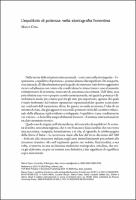Chapter L’equilibrio di potenza nella storiografia fiorentina
| dc.contributor.author | Bozzo, Luciano | |
| dc.date.accessioned | 2022-12-22T16:05:03Z | |
| dc.date.available | 2022-12-22T16:05:03Z | |
| dc.date.issued | 2022 | |
| dc.identifier | ONIX_20221222_9788855185950_14 | |
| dc.identifier.issn | 2704-5919 | |
| dc.identifier.uri | https://library.oapen.org/handle/20.500.12657/60352 | |
| dc.language | Italian | |
| dc.relation.ispartofseries | Studi e saggi | |
| dc.subject.classification | thema EDItEUR::J Society and Social Sciences::JP Politics and government::JPA Political science and theory | en_US |
| dc.subject.other | Balance of power | |
| dc.subject.other | Guicciardini | |
| dc.subject.other | Florentine historiography | |
| dc.subject.other | system of states | |
| dc.title | Chapter L’equilibrio di potenza nella storiografia fiorentina | |
| dc.type | chapter | |
| oapen.abstract.otherlanguage | Although Francesco Guicciardini is usually credited with the idea of balance of power, other Florentine historians prior to him had had similar insights. The essay presents the evolution of the notion of balance of power in Florentine historiography from the 14th-century chronicles of Giovanni and Matteo Villani to Guicciardini himself. Florentine historians put forward two basic meanings of balance of power, first as aggregation of forces against the most powerful state, second as an arrangement of the international system as a whole. The former is based on the elementary idea that those who fear the strongest state create alliances with those who share similar concerns, and it amounts to an ad hoc security tool; the latter entails the awareness of the existence of a system of states, which gradually came up from the beginning of the 15th century onwards. | |
| oapen.identifier.doi | 10.36253/978-88-5518-595-0.05 | |
| oapen.relation.isPublishedBy | bf65d21a-78e5-4ba2-983a-dbfa90962870 | |
| oapen.relation.isbn | 9788855185950 | |
| oapen.series.number | 238 | |
| oapen.pages | 14 | |
| oapen.place.publication | Florence |

